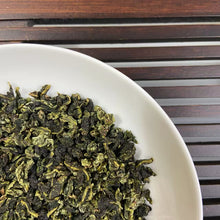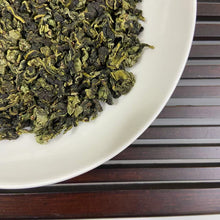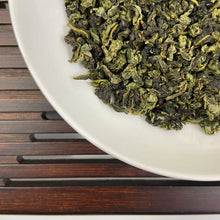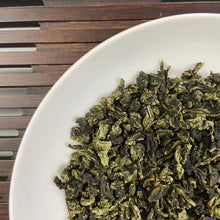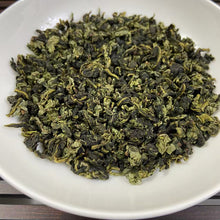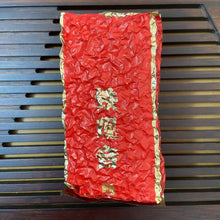
Starting from 100g, the tea will be vacuum-sealed. Each bag contains 100g.
Experience the exquisite character of our 2025 Autumn "Zheng Wei - Tie Guan Yin" A++ Grade Oolong Tea, directly sourced from the renowned XiangHua Town. This exceptional Tie Guan Yin embodies the pinnacle of traditional craftsmanship and the pristine terroir of its origin.
Appearance: The dry leaves present a beautiful spectacle of tightly rolled and curled tea threads, boasting a vibrant dark green hue that speaks to its quality and careful processing.
Fragrance: Upon infusing, prepare to be captivated by an exquisite, orchid-like floral fragrance that gracefully ascends from the warmed leaves. This captivating aroma is a hallmark of premium Tie Guan Yin, promising a truly aromatic journey.
Liquor & Flavor: The steeped tea yields a clear tea liquor with remarkable brightness, shimmering with a golden-green luminescence. Each sip delivers a refreshing sweetness perfectly balanced with a rich, authentic tea flavor. The initial taste transitions smoothly, leaving a clean and satisfying impression.
Aftertaste & Sensation: The experience culminates in a lingering aftertaste that brings forth a delightful Huigan (回甘 - returning sweetness) and a pleasant saliva production, a clear indicator of a high-quality Oolong. Beyond its taste, this tea offers a wonderfully soothing and mind-relieving sensation, making it an ideal companion for moments of tranquility.
Overall: This "Zheng Wei" Tie Guan Yin is a testament to the dedication of its producers, offering a harmonious balance of visual appeal, intoxicating aroma, delightful flavor, and profound aftertaste. It is highly recommended for daily consuming, providing a consistent and rewarding tea experience that can uplift your spirit.
Brewing Recommendation: To unlock the full spectrum of this tea's nuanced flavors and aromatic depth, we recommend using water heated to 90°C–95°C (194°F–203°F). Employ approximately 5 grams of tea leaves for every 150ml of water. Begin with a brief steep of 10–20 seconds for the first infusion, progressively increasing the duration for subsequent brews. 1 This exceptional tea is capable of yielding multiple infusions, each revealing subtle new dimensions of its distinguished profile.
Storage: To maintain the peak freshness and preserve the exquisite characteristics of this "Xiao Qing" Tie Guan Yin, store it in an airtight container in a cool, dark environment, ideally under refrigeration. Protect it from moisture, light, and strong odors to ensure its premium quality is retained over time.
______________________________________
A more comprehensive introduction to Tie Guan Yin.
The authentic origin of Tie Guan Yin is Anxi County in Fujian Province, where it is harvested during four seasons: spring tea, summer tea, autumn tea, and winter tea. Among these, the teas harvested in spring and autumn are of the highest quality. The fragrance of Tie Guan Yin is often referred to as having an orchid aroma.
Tie Guan Yin can be classified into three main flavor profiles:
1. Lightly Fragrant Tie Guan Yin (also known as “Qingxiang” Tie Guan Yin), called “Qingcha” in Anxi.
2. Richly Fragrant Tie Guan Yin (also known as roasted Tie Guan Yin or “Tanbei” Tie Guan Yin), called “Shuhuocha” in Anxi.
3. Aged Tie Guan Yin ("Tie Guan Yin Lao Cha" or simply "Lao Tie"), which has been aged over time.
In the market, the lightly fragrant Tie Guan Yin accounts for 90% of the total circulation. This is mainly because within this category, there are four sub-flavors, each offering a unique sensory and taste experience.
Let’s break down the four subcategories of lightly fragrant Tie Guan Yin:
1. Lightly Fragrant Tie Guan Yin
If you believe that “lightly fragrant” simply refers to the light fragrance, you’re only partially correct. This category is named for its processing method, not just its fragrance. For instance, “Xiaoqing” and “Tuosuan” processes produce teas with very strong aromas. So, it’s important to remember that lightly fragrant Tie Guan Yin refers to the “Qingcha” (light tea) processing method in Anxi.
Due to differences in the fermentation process, this category can be further divided into the following subcategories:
1. Zhengwei
2. Xiaozheng
3. Xiaoqing
4. Tuosuan
These four types are primarily distinguished by their degree of fermentation:
• Zhengwei > Xiaozheng > Xiaoqing > Tuosuan.
Each has its own distinct aroma and taste, which we will now explain in more detail:
1. Zhengwei Tie Guan Yin
Zhengwei has the highest level of fermentation among the four, resulting in a strong aftertaste and durability over multiple brews. It is most suitable for tea drinkers with sensitive stomachs. This method closely resembles the traditional processing technique, where the tea is picked in the morning and roasted the next day.
• Characteristics:
The dry leaves are dark black or yellow-green. The tea soup has a clear fragrance, and the taste is gentle, sweet, and smooth. The aroma spreads from the throat, leaving a lasting sweetness and producing salivation. The tea soup is mild and fragrant, but if you find it too light, it may not suit your taste.
2. Xiaoqing Tie Guan Yin
Xiaoqing refers to a modern processing method where air conditioning is used to cool the leaves and create an ideal environment for oxidation. Fermentation is relatively light.
• Characteristics:
The dry leaves are bright green or dark green and visually appealing. The dry tea has a strong aroma, the tea soup is full-bodied, and the taste is sweeter and more intense than Zhengwei. Many newcomers to Tie Guan Yin enjoy Xiaoqing for its rich aroma and sweet flavor. However, those with sensitive stomachs may find it less suitable.
3. Xiaozheng Tie Guan Yin
Xiaozheng falls between Zhengwei and Xiaoqing in terms of fermentation. It combines the floral fragrance of Zhengwei with the stronger tea liquor of Xiaoqing.
• Characteristics:
The dry leaves are a mix of green and yellow. The aroma is pronounced, the tea soup is relatively strong, and the tea base has a floral scent. Xiaozheng is quite similar to Zhengwei but has a higher aroma and slightly less elegance. The fermentation level is lower than Zhengwei, making the taste slightly less smooth.
4. Tuosuan Tie Guan Yin
Tuosuan refers to tea leaves that are roasted on the third morning after picking, resulting in light fermentation.
• Characteristics:
The dry leaves are large and green, similar to Xiaoqing. The dry tea has a distinct sour aroma, and the tea soup is strong and stimulating, with a noticeable sourness. Those with a less sensitive palate may prefer this over Zhengwei, but the light fermentation can cause acid reflux in some tea drinkers, so it’s not recommended for those with sensitive stomachs.
2. Richly Fragrant Tie Guan Yin (Tanbei or Shuhuo Tea)
After discussing lightly fragrant Tie Guan Yin, let’s move on to the second major category: richly fragrant Tie Guan Yin.
First, let’s clarify a common misconception: “richly fragrant” does not necessarily refer to a strong aroma. This tea is made by roasting lightly fragrant Tie Guan Yin at high temperatures to further enhance the flavor.
• Characteristics:
After roasting, the tea leaves take on various shades of yellow or black. The aroma includes a distinctive charcoal scent, with variations depending on the roasting level. The flavor is somewhat similar to Yancha (rock tea), with notes of charcoal, rice, and honey, though it still has its unique characteristics.
Subcategories of Richly Fragrant Tie Guan Yin:
• Light Roast
• Medium Roast
• Heavy Roast
The roasting intensity affects both the color and flavor of the tea, with heavy roast teas becoming darker and tasting more like charred flavors.
3. Aged Tie Guan Yin
Aged Tie Guan Yin refers to tea that has been properly sealed and stored for more than ten years, allowing it to undergo natural aging under optimal conditions. It is important to note that not all tea can become aged tea—high quality and proper storage are essential.
• Characteristics:
Aged Tie Guan Yin has a charcoal fragrance and a mellow, thick taste, with hints of herbal sweetness and a smooth, rich texture in the tea soup.








